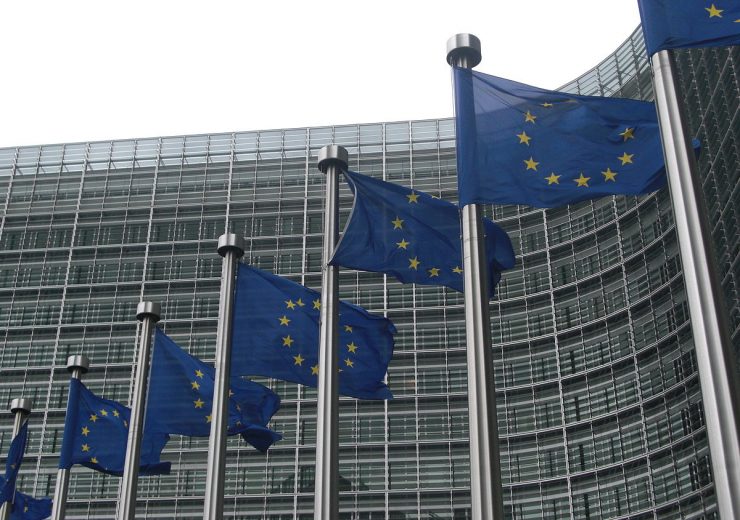The group of traders from the banks have participated in a cartel in the primary and secondary markets for European Government Bonds

Flags in front of the European Commission building. (Credit: Sébastien Bertrand/Wikipedia.)
The European Commission has found that Bank of America, Natixis, Nomura, NatWest, UBS, UniCredit and WestLB (Portigon) were violating the EU antitrust rules over bonds trading cartel.
The group of traders from the banks have participated in a cartel in the primary and secondary market for European Government Bonds (EGB) from 2007 to 2011.
Nomura, UBS and UniCredit have been fined a total of €371m, while NatWest was not fined for it has revealed the violation to the EC, said the European regulator.
Also, Bank of America and Natixis were not fined as their infringement crossed the limitation period for imposition of fines.
Portigon, the legal and economic successor of WestLB was imposed no fine, because it did not generate any net turnover in the prior business year, which served as a cap to the fine.
European Commission executive vice-president, competition policy in charge Margrethe Vestager said: “A well-functioning European Government Bonds market is paramount both for the Eurozone Member States issuing these bonds to generate liquidity and the investors buying and trading them.
“Our decision against Bank of America, Natixis, Nomura, RBS, UBS, UniCredit and WestLB sends a clear message that the Commission will not tolerate any kind of collusive behaviour.
“It is unacceptable, that in the middle of the financial crisis, when many financial institutions had to be rescued by public funding these investment banks colluded in this market at the expense of EU Member States.”
The investment banks have participated in a cartel through a group of traders working on their EGB desks, who were in regular contact through chatrooms on Bloomberg terminals.
In the chatrooms, the traders exchanged commercially sensitive information, including information and updates on prices and volumes offered in the run up.
Also, they discussed their bidding strategy in the run up to the auctions of the Eurozone Member States while issuing Euro-denominated bonds on the primary market+.
The commission concluded that the behaviour of the seven banks breached the EU rules that prohibit anticompetitive business practices, and affected the entire European Economic Area (EEA).
EC said that the fines were decided based on its 2006 Guidelines on fines, and considered the nature of infringement, its geographic scope, duration, and sales value in the EEA.
The European Commission has found that Bank of America, Natixis, Nomura, NatWest, UBS, UniCredit and WestLB (Portigon) were violating the EU antitrust rules over bonds trading cartel.
The group of traders from the banks have participated in a cartel in the primary and secondary market for European Government Bonds (EGB) from 2007 to 2011.
Nomura, UBS and UniCredit have been fined a total of €371m, while NatWest was not fined for it has revealed the violation to the EC, said the European regulator.
Also, Bank of America and Natixis were not fined as their infringement crossed the limitation period for imposition of fines.
Portigon, the legal and economic successor of WestLB was imposed no fine, because it did not generate any net turnover in the prior business year, which served as a cap to the fine.
European Commission executive vice-president, competition policy in charge Margrethe Vestager said: “A well-functioning European Government Bonds market is paramount both for the Eurozone Member States issuing these bonds to generate liquidity and the investors buying and trading them.
“Our decision against Bank of America, Natixis, Nomura, RBS, UBS, UniCredit and WestLB sends a clear message that the Commission will not tolerate any kind of collusive behaviour.
“It is unacceptable, that in the middle of the financial crisis, when many financial institutions had to be rescued by public funding these investment banks colluded in this market at the expense of EU Member States.”
The investment banks have participated in a cartel through a group of traders working on their EGB desks, who were in regular contact through chatrooms on Bloomberg terminals.
In the chatrooms, the traders exchanged commercially sensitive information, including information and updates on prices and volumes offered in the run up.
Also, they discussed their bidding strategy in the run up to the auctions of the Eurozone Member States while issuing Euro-denominated bonds on the primary market+.
The commission concluded that the behaviour of the seven banks breached the EU rules that prohibit anticompetitive business practices, and affected the entire European Economic Area (EEA).
EC said that the fines were decided based on its 2006 Guidelines on fines, and considered the nature of infringement, its geographic scope, duration, and sales value in the EEA.
